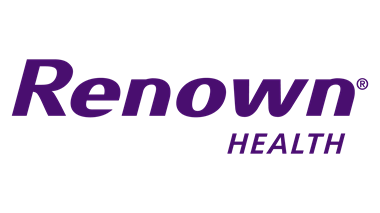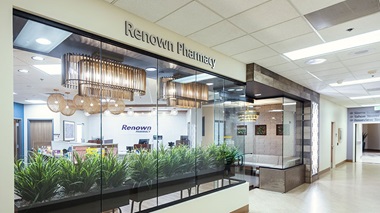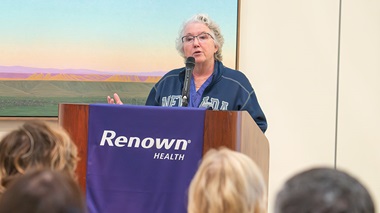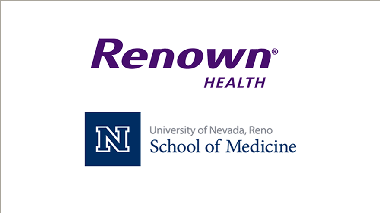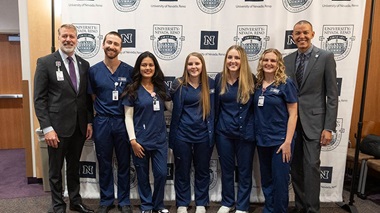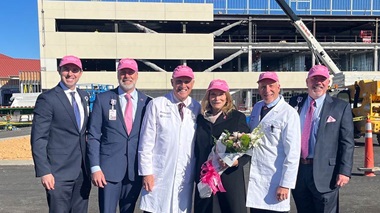Noticias destacadas
Carreras profesionales
Awards & Accreditations
University of Nevada, Reno
Fundación de Renown Health
Recursos de medios

Renown Health's public relations team supports media partners in finding experts on diverse health care topics. In addition, we provide information and answer all questions regarding Renown. We look forward to working with you.
-
Medios en el campus
A los fines de la confidencialidad del paciente, las políticas de Renown Health requieren que los medios de comunicación estén acompañados por el personal de Relaciones Públicas en todo momento.
El personal de Relaciones Públicas se complacerá en hacer los arreglos necesarios para el estacionamiento, notificará al personal del hospital correspondiente y lo ayudará a encontrar su destino.
Presentaciones/transmisiones en vivo
Los medios de comunicación pueden realizar reuniones presenciales y transmisiones en vivo en nuestros campus. A fin de proteger la confidencialidad del paciente y la fluidez del paso, un miembro del personal lo ayudará a encontrar la mejor ubicación para su historia.
Le pedimos que respete nuestra obligación de proteger el bienestar de nuestros pacientes y el derecho legal a la privacidad.
-
Consultas sobre el estado del paciente
Cumplimos con las reglamentaciones de la Ley de Portabilidad y Responsabilidad de Seguros de Salud de 1996 (Health Insurance Portability and Accountability Act, HIPAA) para todos los pacientes, incluidos los pacientes de interés público. Las reglamentaciones de la HIPAA especifican qué información puede y no puede divulgarse sin la autorización de un paciente.
Las reglamentaciones de privacidad del paciente solo nos permiten compartir información relacionada con el estado de aquellos pacientes que figuran en nuestro directorio.
Las consultas de los medios de comunicación requieren que se escriba correctamente el nombre y el apellido del paciente.
Definiciones de “estado” utilizadas por Renown Health
Al describir el estado de un paciente, solo podemos divulgar los siguientes estados de pacientes:
Bueno: los signos vitales, como el pulso, la temperatura y la presión arterial, se mantienen estables y dentro de los límites normales. El paciente está consciente, cómodo y no presenta complicaciones.
Regular: los signos vitales se mantienen estables y dentro de los límites normales. El paciente está consciente y alerta, aunque puede sentirse incómodo o adolorido, y puede tener complicaciones menores.
Grave: los signos vitales pueden ser inestables o estar fuera de los límites normales. El paciente está gravemente enfermo o lesionado y puede tener complicaciones importantes.
Crítico: los signos vitales son inestables o están fuera de los límites normales. Existen complicaciones importantes.
Nota: “Estable” no es un estado.
Comunicados de prensa
-
Research Shows Genetic Approaches to Breast Cancer Screenings Yield More Accurate Results
Clinical researchers with the Healthy Nevada Project co-author research paper with findings that emphasize the need for a comprehensive approach to breast cancer risk assessment – including a focus on genetic medicine – to help ensure that individuals at high risk are identified and supported proactively rather than reactively. Breast cancer is a leading cause of cancer death among women in the United States. According to the American Cancer Society, about 1 in 8 women will develop breast cancer and about 1 in 39 women will die from breast cancer. Breast cancer is associated with increased age, hereditary factors, obesity, and alcohol use. Since 1990, breast cancer death rates have declined progressively due to advancements in treatment and detection. In Nevada there are an estimated 2,310 new breast cancer cases a year, and genetic mutations such as in the genes BRCA1 or BRCA2 remain a top risk factor for this prevalent disease. Recognizing the urgency for progress in breast cancer research, a collaborative effort between physicians, advanced practice providers and scientists from the Healthy Nevada Project® (HNP) and Helix have unveiled groundbreaking research. This study explores how genetic screenings are a necessary supplement to traditional testing methods, together offering more accurate insights into a patient's likelihood of developing breast cancer in the future. HNP is operated by Renown Genomic Medicine and the Institute for Health Innovation and is one of the largest community-based population health studies in the country. Their team works in collaboration with Helix, a leader in precision health that delivers comprehensive genomic solutions. Together, this dynamic partnership aims to understand breast cancer risk factors and pave the way for more effective preventative measures. The combined research team studied 25,591 female HNP participants to evaluate the performance of different genetic screening approaches to identify women at high risk of breast cancer. The results of this research suggest that a combined monogenic, or single-gene, and polygenic, or multi-gene, approach to breast cancer screenings helped produce more accurate results and more closely identify study participants who have a high genetic risk of developing the disease. "Based on this research, we are advocating a shift in approach which would improve breast cancer risk assessment through a combination of effective family history ascertainment and genetic screening,” said Joseph Grzymski, PhD, principal investigator of the Healthy Nevada Project, research professor at the University of Nevada, Reno School of Medicine and co-author of the breast cancer research paper. “This tailored approach, founded on the assessment of individual genetic risk, not only intends to elevate patient well-being but also will improve efficiency and equity in healthcare." Complementing the team’s research on leveraging genetics to identify women at low genetic risk of breast cancer that could safely defer mammogram screenings by five to 10 years that was released in late 2023 in JAMA Oncology, the study suggests that incorporating genetic information can assist in personalizing breast cancer screenings and optimizing the use of screening resources. "Existing disparities persist across various facets of breast cancer screening and treatment; however, genetic screening is clearly a powerful tool to help facilitate early intervention for those at higher risk,” said Jamie Schnell Blitstein, APRN, a primary care nurse practitioner at Renown Health and co-author of the breast cancer research paper. “By placing a heightened focus on risk, we underscore the pivotal role of preventative breast cancer screening.” Despite the availability of effective methods for early screening, co-authors of this research found that 78 percent of women with a family history of breast cancer had their risk ascertained only after a breast cancer diagnosis. The findings emphasize the need for a comprehensive approach to breast cancer risk assessment – including a focus on genetic medicine – to help ensure that individuals at high risk are identified and supported proactively rather than reactively. “These findings that can profoundly impact how healthcare is delivered were only made possible by all the participants who were willing to consent to research,” said Alex Bolze, PhD from Helix and co-author of the publication. “Broad-scale collaboration projects like these between Renown Health and UNR that engage large populations where participants share both their genetic information as well as electronic health records drive advancements in preventative medicine, as well as fundamental biological research.” The research paper was officially accepted on Jan. 29, 2024, and will be published by Elsevier, Inc. on behalf of the American College of Medical Genetics and Genomics. The contents of the paper will appear in the international journal Genetics in Medicine Open. Read the full article by visiting sciencedirect.com. The Healthy Nevada Project is currently recruiting new study participants. Free to all Nevadans with a saliva sample or blood draw, participants and their referring providers receive access to whole-exome sequencing and clinical grade results that help provide insight into their unique genetic risks tied to heart disease and certain cancers. If you are interested in enrolling in the study, schedule a Virtual Consent Appointment through MyChart or contact the Renown Institute for Health Innovation at RenownIHI@renown.org or (775) 982-6914 to be connected to a Genomic Representative. About Renown Health Renown Health is the region’s largest, not-for-profit integrated healthcare network serving Nevada, Lake Tahoe and northeast California. Con una fuerza laboral diversa de más de 7,000 empleados, Renown ha fomentado una cultura de excelencia, determinación e innovación de larga data. La organización se compone de un centro de urgencias, dos hospitales de cuidados agudos, un hospital infantil, un hospital de rehabilitación, un grupo médico y una red de atención de urgencias y Hometown Health, la compañía de seguros sin fines de lucro más grande de la región y de propiedad local, Hometown Health. Renown is currently enrolling participants in the largest community-based genetic population health study, the Healthy Nevada Project®. To join the Renown Health team, visit renown.org/careers. Acerca de Helix Helix es la compañía líder en genómica y vigilancia viral de la población cuyas operaciones se basan en el cuidado clínico, la investigación y el análisis de datos. Helix enables health systems, life sciences companies, payers, and government partners to accelerate the integration of genomic data into patient care and public health decision-making. Learn more at helix.com.
-
Awareness Saves Lives: Renown se viste de azul en el Mes de la Concientización sobre el Cáncer Colorrectal
After a year of possibly delayed colorectal cancer screenings due to theCOVID-19 pandemic, it’s more important than ever to raise awareness for colorectal cancer. March is National Colorectal Cancer Awareness Month- a time to raise awareness for colorectal cancer and the importance of routine, life-saving screenings. Renown invites the community to join the organization in helping put an end to the preventable disease. Blue is the designated color to bring awareness to colorectal cancer and those impacted by it. The iconic “LOVE” sculpture at the main entrance of Renown Regional Medical Center located at 1155 Mill Street in Reno, Nev. will shine brightly in blue each evening in March, serving as a visual reminder to passersby to schedule a colorectal screening. La Colorectal Cancer Alliance estima que se presentarán 149,500 nuevos casos de cáncer de colon solo en 2021. While colorectal cancer may be the second deadliest cancer in men and women combined, it is also one of the most preventable cancers with screenings. “Unfortunately, due to the COVID-19 pandemic, there’s been a decline in colorectal screenings nationwide,” said Tony Slonim, MD, DrPH, President and CEO of Renown Health. “We know early detection is key in preventing the spread of any cancer, and with regular screenings, we know colorectal cancer is easily detectable and treatable. As a cancer survivor, I know how important it is to get back on track with regular screenings and preventive care. Making your health a priority now will help you experience a healthier and brighter tomorrow.” “We invite the community to join us at Renown in spreading awareness about colorectal cancer and its prevention,” said Susan Cox, director of cancer services at the Renown Institute for Cancer. “It takes all of us to put an end to colorectal cancer. If you’re up to date on your screenings, remind a loved one to schedule their next screening--as your reminder may have the power to save their life.” “Colorectal cancer usually forms from precancerous polyps, or abnormal growths, in the colon or rectum, which can become malignant without presenting any symptoms. Screening tests like stool tests, colonoscopies, and others can detect these precancerous polyps, so they can be removed by a physician before turning into cancer. Screening tests can also find colorectal cancer early, resulting in better treatment outcomes,” says Christos Galanopoulos, M.D., MBA, oncologic surgeon, VP Renown Health & Chair of Surgery for Renown Health. El Dr. Galanopoulos agrega: “la mayoría de las personas comienzan a realizarse exámenes de detección del cáncer colorrectal después de cumplir los 50 años. However, some individuals may begin screenings earlier if they have an increased risk of colorectal cancer, such as a family history with the disease. Regardless of one’s personal or family history of colorectal cancer, it’s important to talk to your doctor about the right time to begin your screenings.” Max J. Coppes, MD, Cancer Center Director, Renown Institute for Cancer adds, “While routine screenings are the only way to determine colorectal health, some healthy habits may reduce your risk for colorectal cancer. Estos factores incluyen mantener un peso saludable, mantenerse físicamente activo, seguir una dieta rica en frutas frescas, verduras y granos integrales, limitar el consumo de alcohol y no fumar”. El Dr. Coppes explica que “1 de cada 500 estadounidenses dará positivo para el síndrome de Lynch, una afección genética que aumenta el riesgo de padecer cáncer de colon, cáncer de endometrio y otros tipos de cáncer. It is also known as hereditary nonpolyposis colorectal cancer. People with Lynch Syndrome are also susceptible to colon polyps at a younger age. The Healthy Nevada Project research team is looking at the occurrence of important inherited genetic variants in our population that increase the risk of certain diseases. These include Familial Hypercholesterolemia, Hereditary Breast and Ovarian Cancer Syndrome and Lynch Syndrome.” To enroll in The Healthy Nevada Project, a clinical study (saliva test) offering the opportunity to learn about your ancestry, diet insights and genetic risks linked to heart disease and certain cancers, including prevention strategies, at no cost, enroll here. For a limited time, Nevada residents may request a free DNA test kit that will be shipped to your home. Renown experts encourage every adult to talk to their doctor about their colorectal cancer risk and screening options. Aquellos que buscan programar un examen de detección o una visita de atención con un proveedor de atención primaria de Renown pueden a llamarnos al 775-691-7308 o a visitar nuestro sitio web para obtener más información. About Renown Health Renown Health is the region’s largest, locally owned and governed, not-for-profit integrated healthcare network serving Nevada, Lake Tahoe and northeast California. Con una fuerza laboral diversa de más de 7,000 empleados, Renown ha fomentado una cultura de excelencia, determinación e innovación de larga data. La organización se compone de un centro de urgencias, dos hospitales de cuidados agudos, un hospital infantil, un hospital de rehabilitación, un grupo médico y una red de atención de urgencias y Hometown Health, la compañía de seguros sin fines de lucro más grande de la región y de propiedad local, Hometown Health. Renown’s institute model addresses social determinants of health and includes: Child Health, Behavioral Health & Addiction, Healthy Aging and Health Innovation. Clinical institutes include: Cancer, Heart and Vascular Heath and Neurosciences. Actualmente, Renown está inscribiendo participantes en el estudio genético de salud poblacional basado en la comunidad más grande del mundo, el Healthy Nevada Project®.
